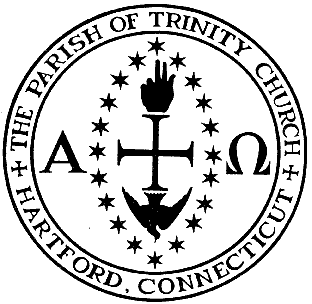
History
Trinity Parish was founded in 1859 by 12 families living in then-suburban Asylum Hill. It soon became a "free church", where, there being no pew rents, any person "no matter what his or her wealth or poverty" might find spiritual nourishment. Trinity's first building, a former Unitarian Meeting House, was moved stone-by-stone to the present site.
Construction on a rectory (now office wing) began in 1881. Between 1892 and 1898, with the support of a gift from the Reverend Francis Goodwin, Trinity's third Rector, and his wife, Mary, Goodwin Hall was built and the original church building replaced by the present one. The education wing was completed in 1961 to mark the 100th anniversary of the parish founding.
Rectors of Trinity Church have been the following:
Pelham Williams 1861 - 1863
Simon G. Fuller 1863 - 1865
Francis Goodwin 1865 - 1871
Edwin E. Johnson 1871 - 1883
Storrs O. Seymour 1883 - 1893
Ernewst DeF.Miel 1893 - 1925
Raymond Cunningham 1925 - 1950
E. Kingsland Van Winkle 1951 - 1971
Edward P. Townsend 1971 - 1979
William R. Payton 1980 - 1982
William J. Eakins 1984 - 2002Donald L. Hamer 2004 -
The
Episcopal Church
Trinity Church is a parish of the Episcopal Church in the United States. Congregations of the Church of England in the former American colonies formed the Episcopal Church in 1789. The word "Episcopal" means "having bishops"; it is derived from the Greek word for bishop, episkopos. Members of the Church are called Episcopalians. The Episcopal Church is also called Anglican because its heritage is English and because it is still in communion (united) with the Church of England and other Anglican Churches around the world. These Churches make up the Anglican Communion, with nearly 70 million members in 36 self-governing Churches in 164 countries. Bishops of the Anglican Communion meet every ten years at the Lambeth Conference in England. The most recent Lambeth Conference took place in July of 1998.
Anglicanism includes both Catholic and Protestant traditions. In the 16th century, the Church of England, rejecting the claim of the Pope's universal authority, broke with the Roman Catholic Church, yet preserved the ancient apostolic faith, the ministry of bishops, priests and deacons, and the sacraments, and so remained Catholic. Anglicans are at the same time Protestant, emphasizing the authority of Scripture and the proclamation and understanding of the Word of God.
The
worship, policy, and program of the Episcopal Church are governed by its
General Convention, which meets every three years. The most recent General Convention
was held in Denver in July 2000. General Convention is composed of the
House of Bishops and the House of Deputies, the latter made up of lay
and clergy representatives from all the Church's dioceses and missionary
districts. A Presiding Bishop (currently the Most Reverend Frank T. Griswold
III) is elected by the House of Bishops and confirmed by the House of
Deputies to act as the Church's chief pastor. He represents the national
Church at major diocesan events and represent the Episcopal Church in
its relations with other Churches. The Presiding Bishop also provides
leadership in developing the policy and strategy of the Episcopal Church.
The Diocese of Connecticut
The
Diocese of Connecticut is one of 111 dioceses — geographical areas
each headed by a Bishop — in the Episcopal Church. Geographically
related dioceses are organized into Provinces; Connecticut belongs to
Province I, which includes New England, Haiti, the Virgin Islands, and
the American Churches in Europe. Trinity Church is one of
185 parishes in the Diocese of Connecticut. The Diocesan office is located
at 1335 Asylum Avenue, Hartford, 06105 (phone: 860-233-4481). The Right
Reverend Andrew D. Smith serves as Bishop of Connecticut. The Rev. Canon
James E. Curry of Bloomfield and the Rev. Canon Wilfrido Ramos-Orench of
Hartford were both elected as bishops suffragan (assistant bishops) for
the Episcopal Diocese of Connecticut in two successive elections held at
St. John's Episcopal Church, Bridgeport on June 17, 2000. Diocesan Convention
occurs annually in October. Its business includes setting Diocesan policy
and budget and electing persons to Diocesan posts. Trinity Church is represented
at these conventions by its clergy and by two representatives elected at
the annual parish meeting. Trinity's delegates and alternate delegates
to Convention also represent the parish at meetings of the Hartford Deanery,
one of 14 Deaneries (clusters of parishes) in the Diocese. These meetings
are open to all interested parishioners.
Membership/Newcomers
When to call Parish clergy
Parish Organization -
(Staff admin, volunteers)
Directions/Map
Trinity Buildings

